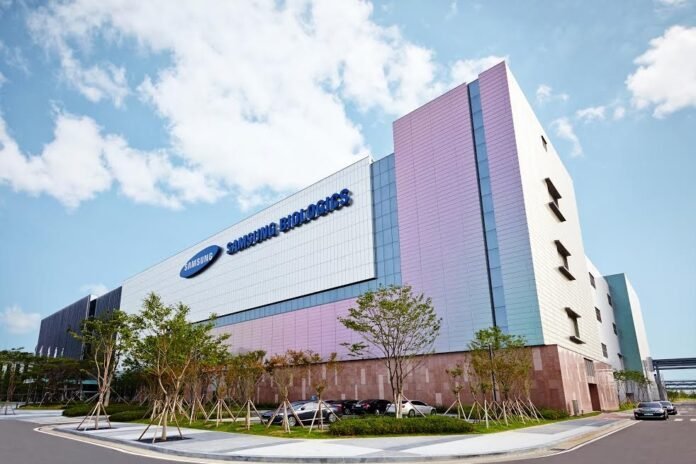John Rim, CEO of contract development and manufacturing organization Samsung Biologics, believes his company is growing into a “top-tier pharmaceutical company.” Rim explained Samsung Biologics’ development strategy at the 2023 J.P. Morgan Healthcare conference in January. He highlighted three avenues of growth that the CDMO continues to pursue: building capacity, diversifying its portfolio, and expanding its global footprint.
Samsung Biologics made strides toward these goals in 2022, and Rim took the opportunity at the conference to further outline new developments planned for 2023.
“The strategies outlined today will not only drive growth this year but also build sustainable foundations for the long term,” said Rim. “We will continue to grow, ultimately to provide maximum satisfaction to our clients and to our investors.” He went on to explain strategies that connect to three trends the CDMO has identified as industry drivers: innovative expansion, modality diversification, and sustainable management.
Ultimately, said Rim, Samsung Biologics’ implementation of its multidimensional growth strategy to grow with these trends will lead it to become a “top-tier pharmaceutical company.”
Portfolio Diversification
For Samsung Biologics, a key aspect of progressing toward this goal is expansion beyond traditional CDMO services. While it’s established an expertise partnering with clients to develop and manufacture monoclonal antibodies over its years of operations, in recent years Samsung Biologics has sought to diversify its portfolio. The company has pursued this strategy both through internal development and strategic acquisitions, also known as organic and inorganic growth.
In 2022, the CDMO’s organic portfolio diversification efforts included the completion of an end-to-end mRNA vaccine production suite where it can both produce the active drug substance in mRNA vaccines and package it in the final drug product used by consumers.
Samsung Biologics has already used these capabilities to complete a commercial-scale production run of an mRNA vaccine candidate for a client, and it will look to continue to pursue mRNA vaccine production partnerships in 2023 and beyond.
While COVID-19 vaccines are currently the only mRNA vaccines approved for human use, one Nature report found that there are 137 mRNA vaccine candidates in the pipeline, with 76% in the preclinical stage and 24% in clinical development. The February 2022 report noted that this is “rapidly changing.” This is because mRNA vaccines can be easily edited and tested, particularly through digital and AI technology, so development can proceed rapidly. Many in the research community are optimistic about the technology’s application beyond COVID-19, particularly in cancer treatments.
In addition to mRNA, Samsung Biologics invested in biosimilars in 2022, fully acquiring Samsung Bioepis, a biosimilars company that Samsung Biologics started as a joint venture with Biogen 10 years prior.
Samsung Bioepis recently received FDA approval for a high-concentration version of Hadlima, a biosimilar that references Humira (adalimumab), one of the industry’s most prescribed drugs. Humira is used to treat several autoimmune conditions, including rheumatoid and other forms of arthritis, psoriasis, ulcerative colitis, Crohn’s disease, noninfectious uveitis, and hidradenitis.
Humira, which totaled sales of $21.2 billion in 2022, is expected to lose significant market share to biosimilars, with AbbVie, the company that makes Humira, predicting a 37% decrease in sales.
“From a portfolio perspective, we have the broadest biosimilar portfolio with 10 products,” said Rim. “The biggest opportunity for us this year will be the launch of the Humira biosimilar, which will happen in July this year.”
Rim also explained that the CDMO would pursue new modalities such as antibody drug conjugates and cell and gene therapy. The company will build a new ADC facility in Incheon, which is expected to be ready within next year, and it has invested in a cell and gene therapy company through the Life Science Fund it operates with Samsung C&T. The fund invested in Jaguar Gene Therapy, a gene therapy development company, and Senda Biosciences, which specializes in genetically programmable medicine, in 2022.
Building CDMO Capacity
The CDMO also continues to be committed to building on its industry-leading antibody manufacturing capacity and working with partners with a variety of CDO and CMO needs. A key to this commitment will be the newly constructed Plant 4, which is already partially operational since October 2022 and will be fully functional this year. It’s the largest biomanufacturing facility in the world, with 240,000 liters of capacity.
“The company is also discussing CMO contracts for 34 medicines with 26 biopharmaceutical companies around the world,” he added, explaining that it “currently has CMO contracts with 12 of the top 20 global pharmaceutical companies.”
In 2022, Samsung Biologics purchased 357,366 square meters (about 88.3 acres) of land for the development of its second Bio Campus. The CDMO will continue to build this new facility in 2023. Upon completion, it will house new manufacturing facilities as well as an open innovation center to help incubate and foster collaboration with innovative startups in Korea’s growing biotech hub.
“The company plans to invest a total of 7.5 trillion won ($6 billion) in constructing four new plants and a bio innovation center to nurture promising companies related to next-generation medicines,” Rim said, adding that the CDMO “will decide on building a fifth plant within this year after the fourth plant becomes fully operational.”

